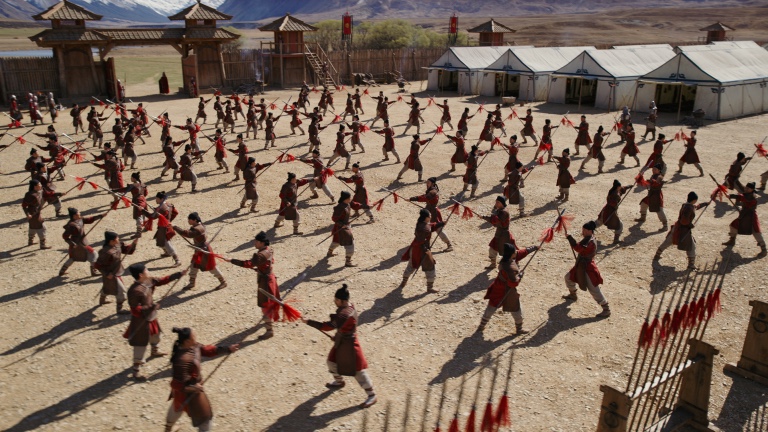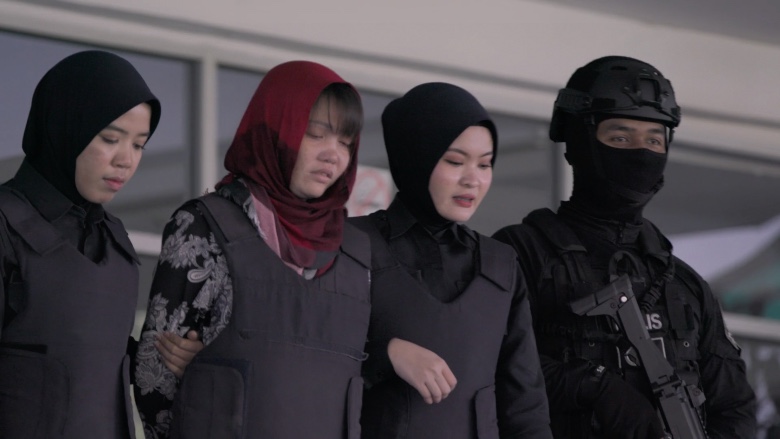
There have been a number of great documentaries in 2020, but one of the better ones is Ryan White’s Assassins, which takes an in-depth investigative look at the assassination of the brother of North Korean dictator Kim Jong-un at a busy Malaysian airport. The two would-be murderers are both young women, Siti Aisyah and Doan Thi Huong.
White has been keeping busy over the past ten years between his six feature films and two television mini-series, some of the highlights being 2014’s The Case Against 8, which followed the long hard road to marriage equality; 2016’s Serena about the famed tennis superstar; and 2019’s Ask Dr. Ruth, about the nonagenarian sex therapist, Dr. Ruth Westheimer.
Assassins is a lot darker than White’s other docs just by the nature of the political intrigue surrounding the two women, as they’re arrested and put on trial with the sentence, if found guilty, being death by hanging.
Below the Line got on Zoom to talk to the filmmaker about his film as well as working with his frequent collaborators. Since this is more about how White made the film, so hopefully you’ll still have suspense for when you get a chance to watch it.
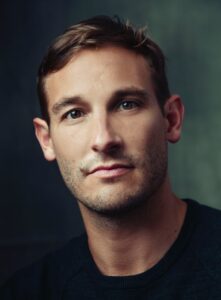
Below the Line: I’ve seen some of your previous docs, and this one seems quite different, at least from your doc on Dr. Ruth Westheimer. How did you find out about this story and decide to get involved in making the it?
Ryan White: The assassination of Kim Jong-nam, who’s Kim Jong-un‘s brother happened in February of 2017. If you look back at that, that was right after Trump was inaugurated. I think like most Americans, I remembered the headline, I remember that he had been assassinated in the airport, and I remember the detail that two women had been the assassins. Because Trump was dominating the airwaves and the headlines here, it fairly quickly dissipated into the ether, and I didn’t know what happened after that. I think most American audiences won’t know what happened after that, based on many of my friends and family who I’ve talked to over the last couple years, who always have a glimmer of recognition but know nothing about how this story played out. I got approached by a journalist named Doug Bock Clark, about six months after the assassination. He had just written an article for GQ Magazine that was a deep dive investigative piece into what led up to this assassination. He was following the Indonesian woman’s path, her name’s Siti Aisya, namely the idea that she was admitting that she had assassinated Kim Jong-nam but saying that she thought she was on a reality show and did it unintentionally. Clearly, that’s a very literally unbelievable story and quite the hook for a journalist or documentary filmmakers. I was on a plane a few weeks later to Malaysia, where this assassination happened, and the women were about to begin their murder trial, which had the sentence of capital punishment. They would be executed by hanging if convicted. Doug and I went to Malaysia, and that’s when I began filming. It was more of an exploratory trip, but my mind was blown once we were on the ground in these dark alleys or taxis or the legal offices. All of these people he was introducing me to that played a part in telling the truth of what happened behind this assassination, I was blown away and found it so compelling. Unfortunately, for my travel schedule, I was going to be returning to Malaysia for a lot over the next two years, which is what happened in the end.
BTL: I remember being at Sundance for Trump’s inauguration, and I remember the Muslim travel ban that followed, but not much else. I definitely didn’t know about the story as I watched the movie. I was surprised it hadn’t been covered more in the news.
White: I think it’s quite the opportunity as a filmmaker that you can find a story, especially one that’s this huge on the geopolitical stage — probably one of the biggest political assassinations of our lifetime — where you can authentically edit your film with suspense. I guess that’s maybe the one good thing that came out of Trump, for me personally, is that now I’m able to make a film where people don’t know about one of the biggest assassinations of our lifetime. I’m hoping people won’t even look up this story if they’re going to watch the film, and they will watch it the same way I experienced while I was making it, which was a total mystery [with] so many twists and turns with one of the most shocking endings of any of my films. How it ends is not how any of us saw it ending. It was a cool opportunity as a storyteller, at least, to do that, to be able to really take audiences on a journey where hopefully they don’t know the ending.
BTL: I love the pacing of the film, which reminded me of a good crime thriller. When you meet the women through social media at the beginning, you really aren’t sure where it’s going, so it’s interesting to see how you put all the facts together. Were you working with your editor from the very beginning? I’m sure you were working on other movies.
White: I was making my Dr. Ruth film at the same time I was making this film, so they were tonally very different, but it’s the same editor. I have a regular editor named Helen Kearns, who I work with — I have a few editors that I regularly work with, but she happened to edit both of these films. I always try to work with her from the very beginning. She’s incredible, she’s such a good sounding board for me, and she’s such a good home base. I probably edit my films I would guess longer than most documentary filmmakers do, because I like that back and forth between Helen and I.

When we’re talking about degree of difficulty for an editor, I think this might have been the highest, because of the films she and I edited together, it was such a complicated web. It was so hard to figure out how to make this make sense to people, because there’s so many layers. Helen had an amazing team underneath her. We had an Associate Editor named Darshan Kembhavi, and basically, his only job for months was to piece together all of the CCTV footage from the airport that day. We were lucky enough to get our hands on it, but it was thousands of hours that we had to figure out almost like a puzzle or like a video game. You’re watching a bustling international airport with tens of thousands of people walking through it. No one had done the work beforehand, saying, “Oh, watch this guy. This is the guy that comes out of this bathroom” or “Look, he changes his clothes at this moment.” Darshan had to watch all of this and figure out this puzzle that we could then piece together for our audience to watch how it actually went down in the airport.
BTL: I spoke to filmmaker Dawn Porter, who directed a couple movies this year. She also worked with the same editor, but they finished one movie first and then worked on the next one. Was that the same case here or were you editing both as you went along and work on whichever one you both were in the mood to work on in any given day?
White: I was doing both at the same time, but she only worked on one at a time. I don’t remember how that played out in the calendar with finishing Dr. Ruth. We finished Dr. Ruth quite early before it came out. That was a documentary that we already had funding by Hulu, and we knew we were going to be submitting to Sundance. It was one of those very rare things for me where we are not editing up until midnight for the Sundance deadline. We pitched it months before and the movie was locked, which allowed us to transition Helen over to Assassins, probably even six or seven months before Dr. Ruth even premiered at Sundance. The calendar worked out very conveniently in that way.
BTL: It seems like every film and filmmaker who goes to Sundance is literally working to finish their movie right up until they get on the plane to go there. When you brought the Dr. Ruth doc to Sundance, you had already been working on Assassins for a year or more?
White: No, I was doing them both at the same time. I often do that. I often shoot two or three films, so right now I’m shooting four at the same time. I love it. It keeps me busy, but I love it tonally. I made The Keepers for Netflix, which was a very dark true-crime series. At the same time I was making that, I was following Serena Williams on the tennis tour. One was very adrenaline pumping and dark and investigative, and one was also adrenaline pumping but also in a much more fun way. I liked that tonally, so was a really nice person to come home to after being in Malaysia and this underbelly for a few weeks at a time. To get to go be with Dr. Ruth and the joy that surrounds her. I was shooting them at the same time, and it drove Dr. Ruth crazy, because she was so concerned about my safety that I was following the North Korean regime and going to Malaysia.
For me, that’s what I love about my job is getting to hop between worlds that can be totally, totally different, and then you don’t have to get swallowed up by darkness. I always get that itch for something investigative, so intellectually or storytelling-wise, I can’t be too long in a joyful world without getting that itch to get back to something dark and investigative, so I try to do both.
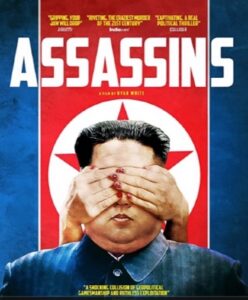
BTL: Was there any point where Dr. Ruth and Serena were in the same room together?
White: Those did not overlap. I don’t think they’ve ever met, but Serena and Dr. Ruth in the same room would be pretty amazing.
BTL: I’m not sure how tall Serena is but it would be amazing just for the high difference, I’d imagine.
White: [laughs] Serena is not as tall as people think she is, but she would still tower over Dr. Ruth. I think Serena’s five ten or five ten, but Dr. Ruth is four seven, so she’d still tower over her.
BTL: Were you actually able to finish Assassins before the pandemic hit or were you still working on it and finishing it up during the pandemic.
White: No, we had finished it. The version that played at Sundance is the finished version, so we were very lucky. What an awful year for everyone and filmmakers included, but I consider myself at least one of the lucky ones that I got to have a premiere of Assassins at Sundance, then the bottom fell out. I was hoping to travel with this film all year, and I hadn’t traveled internationally with any of my films on the festival circuit for years, because I was too busy making other films. I had set a little bit of time aside to travel with this one, which obviously didn’t happen. Thankfully, we were finished it, and we finished it right before this all went down. Coronavirus was bubbling up in Asia just as I was finishing this film in December or January. Thankfully, we finished it when we did because otherwise, it would be totally on pause right now. I still wouldn’t have my ending.
BTL: Or you might get stranded there until they let you back into the country. What has the reaction been to the movie? Has it been screened in any Asian countries or have any of the players involved seen the movie?
White: The film came out in Japan, because Japan has their sh*t together, and theaters are open there. It’s playing in over 100 theaters in Japan, at least dozens of theaters, and doing really well in Japan. Japan is one of the countries that has been all over this story. Unlike Americans being dominated by Trump for the last four years, the Japanese press and media has been following this like crazy. They were very excited about the film. South Korea, obviously, it’s coming out there soon, Hong Kong. So the reaction has been great. I think [for] that continent, this was one of the biggest stories that dominated the last few years for the news media all over Asia. Until the pandemic hit, they were covering it like crazy. Magnolia sold the film internationally, and they did a great job. They sold it not even just all throughout Asia, all throughout the world, so I’m thrilled that it will be seen by so many international audiences as well.
BTL: How much actual contact did you have with the two women at the center of this story?
White: I had contact with them. In fact, we were hoping to bring them over for Sundance, and then we decided to wait, because neither of them had totally been cleared to travel. They were just coming out of this massive ordeal. Then my hope was, “Oh, we’ll bring you later in the year when the film comes out.“ Originally, it was going to come out in the spring and got pushed back and pushed back. I was hopeful that by this point, travel would have resumed and maybe they could come over to the US for release. Obviously, that’s not happening, unfortunately, so hopefully, I’ll be doing some interviews with them and getting them involved in the release in some way. That unfortunately will have to be over Zoom.
BTL: I do want to ask you about some of the other departments since this is for Below the Line, and that’s where our focus is. As far as the sound design, there is a thriller aspect to it, which that contributes to, as well as the music. Were these people you’d worked with on previous movies?
White: Almost everyone I work with is a regular collaborator. I think that’s also because I’m making so many projects at the same time that I have this crew of people that I totally trust at this point. If I’m on the road in Malaysia, my composer can be nailing cues on Ask Dr. Ruth. My composer’s name is Blake Neely – he’s the best. He’s done all of my documentaries since I think my second one. My sound designer’s name is Zach Seivers, and he’s the best, too
The word “thriller” was something that we talked about a lot with all of our crew members, with our composer, with our editor, with our sound designer, and sort of that noir-ish feel to this film of these dark alleys and underbellies of cities and villages. We wanted to really embrace that sort of noir-ish, nightmarish quality. Working with Zach Seivers was a pleasure, as always, and same with Blake. The score he came up with… because like my editor, I start with my composer very early on. In fact, often he’s composing while I’m shooting, and I’ll just listen to cues that he writes while I’m on my airplane or while I’m in the taxi on the way to a shoot. I wonder if it’s almost like an actor. I feel like it puts me in a headspace when I enter the shoot that is different than if I’m just walking out of a taxi, having been on Instagram or something. He and I worked very early on establishing a soundscape and a tone that informs the shoot itself, that doesn’t just come at the end, once you’ve locked picture.
BTL: I’m always generally interested about that relationship between filmmakers and musicians. Do you have any kind of musical background yourself?
White: God, no. I feel like I’ve driven Blake crazy over the last ten years. I’m constantly saying things like, “You know, I love the cue. I just really don’t like the drum,” and he’s constantly having to say, “There are no drums. What you’re talking about is a guitar or a piano or a violin.” I’ve gotten way better at it as time has evolved, but he’s constantly having to talk down to me like a preschooler. He likes that… or he claims he likes that, and we’re very good friends, so we spend a lot of time together, where we’re just hanging out, and then it’ll ping pong between friendship and talking about the sounds of our films. He likes communicating with someone who’s not musically-minded, because then it becomes so much about emotion and tone. I’ve gotten very good at speaking that language to him and not trying to speak in melody or instrumentation, because I’m never gonna get there. We have a spoken language now where I can surely speak in tone or character or emotion to him, and he knows how to instrument that or how to create the melody that I want. We’ve worked together long enough that it happens a lot quicker now.
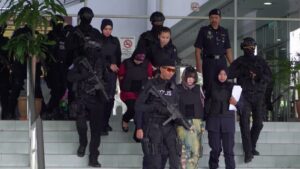
BTL: Do you ever have situations where he’s done a cue for a movie you’re working on that doesn’t really work for that but might work for a different movie? Does music end up in other places than for what it was conceived?
White: Yes, absolutely. We’re such a tight team, so my editor is so familiar with all of Blake’s work. I’m editing three or four films right now, and all of my editors are using Blake’s film from our previous film. It makes for this very efficient process where I’m editing a true crime film now and we’re putting in cues from our Netflix series, The Keepers. Then we can go to Blake by the time we’re editing this new series and say, “Alright, these cues from The Keepers works so well tonally. Write something new, but write it more in this direction.” I don’t think we’ve ever lifted an exact cue that’s gone to a future film, but oftentimes, we’ll put something on ice, like I’ll say, “I love it, but I don’t think it fits this film,” and we’ll put it on ice and months or years later, he has an amazing encyclopedia of all the music he’s written. He can be like, “Hey, remember when we wrote that thing for that Apple show that had this feeling?” and then he’ll go find it and we’ll listen to it and then he’ll be like, “What if we change that this way,” and I’ll say, “Yeah, I always loved that cute. I was always devasted that it didn’t make it into the Apple show.” We’ll change it or metamorphose it in a way that will fit a new show, and then you feel good. You feel like you didn’t totally kill a baby.
BTL: I’m not sure how composers feel about working with a director that has completely temped their movie with their old scores. I’m guessing they’re like, “I wrote that. I don’t want to write that again.”
White: He calls it “temp love.” He hates when directors fall in “temp love” with something, because you edit for so long with that temp music that it’s hard to unravel your scenes from that temp music. But that’s the trust factor. The first time I hear something new that Blake wrote, when I’m in love with the temp, I get jarred, because that’s just the biology of our brains and our ears, I think. I just have to trust that he’s seeing it with fresh eyes and ears that even if it jars me, and I have a knee jerk reaction, like “I don’t like it. I want to go back to what we had.” He can calm me down and say, “Just give me three days, listen to it a few times, and then we’ll change it.”
We’re very good at not hurting each other’s feelings in that type of way, which is what I also love about regular collaborators. When you’re just starting to work with someone you’re really tiptoeing around and hurting each other’s creative feelings. I can say to him, “I don’t like it,” and he can also say to me, “Why the hell are you editing this scene this way? Why are you using this temp which seems so off. It feels like you’re making fun of something that should be serious.” We’re very comfortable having those dialogues
BTL: How does Zach fit in there, especially with Assassins?
White: What’s great is Zach and Blake’s relationship predates mine with both of them, so to have a composer that trusts his sound designer is huge. I’ve also been in situations where the composer doesn’t trust the sound designer at all, and how they’re going to treat their music. Blake and Zach have a very good relationship where Blake trusts Zach with his music. Blake still gets very involved in the sound mix. He wants to be there, and that’s fun. As far as post goes, those are by far my two favorite parts — composing and sound. I struggle a lot more with color, and I love my color artist on this film, too, but he knows I struggle with it. I don’t enjoy that process near as much. I’m involved less in that, and he has a lot more autonomy in that way where I say, “I’m just gonna have to trust you that the magentas are where they should be, because I will drive myself crazy debating the different hues of magenta,” but sound and composition I could do until the cows come home.
BTL: Are you working on anything for next year’s festival circuit?
White: Not for Sundance, thank God, because we just had two Sundances in a row. We’re taking a break this year — I didn’t submit anything. We’ll be finishing a lot this year to come out in 2022, I guess. I had lucky timing that I finished a couple projects before corona, ow I’m editing a few during Corona – that was really the only thing we could accomplish during Corona. I think documentary editors had it easier than scripted ones or television, because we accrue so much footage and editing takes so long. It’s such an art form in itself that if you have to take eight months off just to edit something, that’s not a waste of time. In the documentary world, that can be very fruitful. I’m lucky that I finished a couple projects right before this all went down. That series on Apple came out in February right before Corona, and then the other projects will hopefully–knock on wood– come out in a world that’s a little bit back to normal.
BTL: Maybe in 2022 we’ll have normal film festivals again, so you probably took the right year off.
White: I’m sad I didn’t get to do that with Assassins. Because it’s such an international phone, it would have been a really film to go outside of the US and talk to audience about. Compared to some of my colleagues, my year was a lot easier than theirs, so I’m not complaining.
Assassins is now available in select cities via Virtual Cinema.
All pictures courtesy of Greenwich Entertainment , except where noted.




